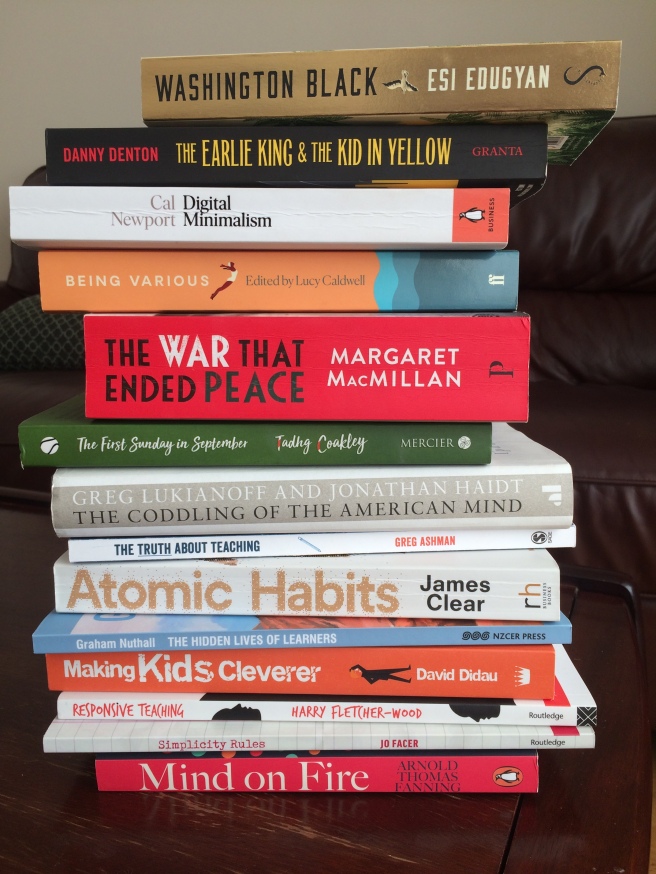December 2019 was a busy time and I never got around to compiling a “Reads of 2018” post. This list is really more of a “reads of the last eighteen months”, although most of them are from summer 2019.

“The Truth About Teaching” by Greg Ashman
A 2018 read sneaking in. You know the colleague who looks sometimes at the CPD library but claims (with justification) that they’re too busy to be reading books about education? This is the book to give them: a one-stop shop of myths, counter-myths, empirical evidence, simplified theory and practical advice.
“Being Various. New Irish Short Stories” edited by Lucy Caldwell
Perfect summer reading with short stories by Danielle McLoughlin, Paul McVeigh and Sally Rooney.
“Atomic Habits” by James Clear.
You knew I would have to get some pop-psychology in here somewhere. We would be far better off helping students develop good habits than vaguely encouraging them to reach for the stars and believe they can achieve it. In terms of the theory of habit formation there is little here that isn’t in books by Charles Duhigg and Kelly McGonigal among others, but where Clear scores is in getting into the detail of how to plan and focus on daily habits and on micro-goals. I saw a teacher on Twitter (can’t remember who it was, sorry!) use what seemed like a template from this book to help students plan their study. They had to specify the time, the place and the exact activity and come up with a suitable, immediate reward for their efforts. I’ll be trying the same thing this year.
“The Earlie King and the Kid in Yellow” by Danny Denton.
This novel deserves to be much more well-known than it is. A riotous yet internally coherent ride through a dystopian Dublin, with a strong cast of well-imagined characters and an excellent feel for neologisms. Hindered slightly by the unconventional punctuation. I can see why Denton does this: new rules for his new universe but feel it may turn off readers and prevent this book reaching the wide readership it completely deserves.
“Making Kids Cleverer” by David Didau.
The title here is provocative. What about educating the whole child or recognising multiple intelligences like “intrapersonal” and “bodily-kinaesthetic”? And surely one’s level of clever is innate? Making kids cleverer by teaching them has come to be seen as akin to making them taller by forty minutes on the rack, but Didau reminds us that there’s a lot we can do to help each child develop their intellectual potential and – just as importantly – that that’s our actual job.
“Washington Black” by Esi Edugyan
Edugyan, along with her husband Steven Price who also a historical novelist, was one of the many writers at the 2019 West Cork Literary Festival. I bought this book after the interview and it is my novel of the year so far.
“Simplicity Rules” by Jo Facer
I had the pleasure of meeting Jo at ResearchED ’18 in London. A recently appointed headteacher, she is full of both positivity and practicality. This book is an antidote to the ever-increasing pile of work-loading fads that plague education. The behaviour management section in particular is one of the most pragmatic I had read.
“Mind on Fire” by Arnold Thomas Fanning.
If you’re curious to know what psychosis feels like and don’t – unlike me – have first-hand experience, then this is the book to explain it to you. Fanning pulls off a considerable feat in rendering the incomprehensible and chaotic into clear and rationale prose. He is also critical, at the end of the book, of the modern tendency to interpret all of life’s challenges through the prism of mental health/illness. Sometimes life is just life, and I agree.
“The War that Ended Peace” by Margaret Macmillan.
A 2018 read that is sneaking its way in here. Essential reading for this age when almost all of us have only ever known peace and are far too presumptive of its continuation.
“Digital Minimalism” by Cal Newport
A follow-up to “Deep Work”, this makes a persuasive case for drastically reducing our everyday tech usage in favour of deliberate harnassing of its benefits so as to benefit, not degrade, our lives.
“The Hidden Lives of Learners” by Graham Nuthall
It is with shame that I admit I did not read this book until earlier this year. Every teacher should as it’ll make you think about teaching like few other books can. Cameras were placed in a classroom over a number of months and the pupils’ conversations (most notably during groupwork) recorded. The gap between what teachers think kids are taking in, and what they actually experience, is revealed.
“1606: Shakespeare and the Year of Lear” by James Shapiro.
One for all the English teachers. Even if you don’t have fifth years this is still illuminating and actually deals more with “Macbeth” than it does with “King Lear” itself. If you like audio-books Shapiro reads these books himself on Audible. I read this one but listened to Shapiro’s earlier book: “1599 A Year in the Life of William Shakespeare”.
When I started writing this post I wondered if I’d end up doing a “Reads of 2019” at the end of the year. Even if I did, it would be short. But as ever the Autumn is seeing a wave of great titles, both educational and (for me) recreational. Reading continues.